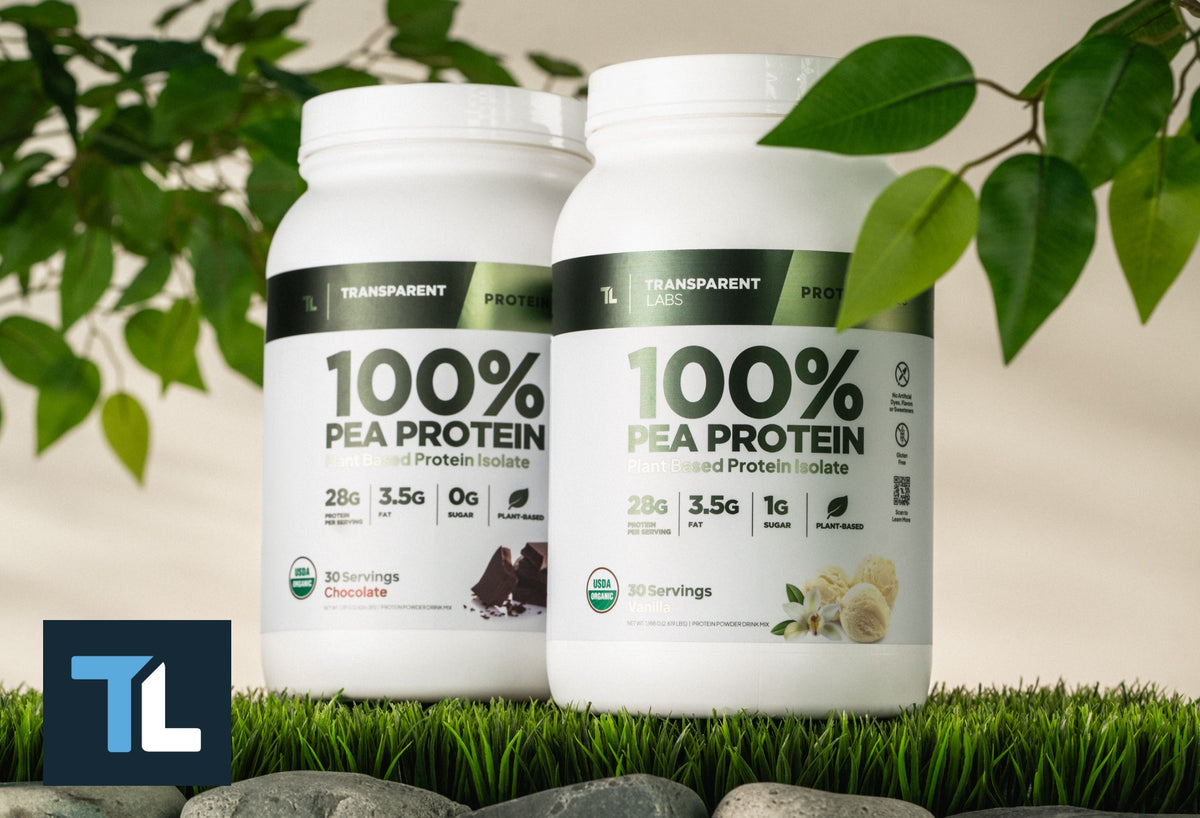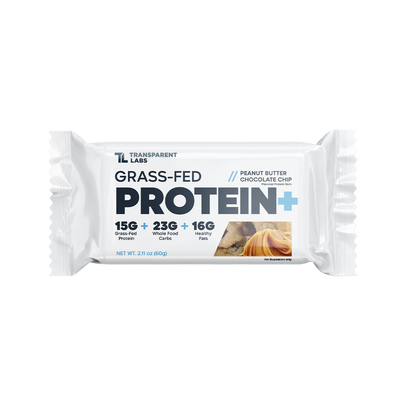Pea Protein vs Whey Protein: What’s Right For You?

When perusing the protein powder section at the local supermarket or supplement store, odds are you've wondered if there's any difference between pea protein and whey protein. Sure enough, protein quality, not just quantity, plays a considerable role in the maintenance and growth of skeletal muscle mass, especially in active individuals, athletes, and the elderly [1].
In recent years, the food industry and consumers alike have taken strong interest in plant-based protein powders as potential substitutes for traditional animal-based protein powders, notably dairy-derived proteins like whey and casein (which may not be suitable for those with lactose intolerance or dairy allergies).
However, based on the current evidence, plant-based proteins aren't necessarily interchangeable with animal-based proteins due to their unique amino acid compositions and differential effects on muscle protein synthesis [2].
In this article, we'll provide an overview of the anabolic properties of pea protein powder—ostensibly the most popular plant-based protein powder—and see how it compares to whey protein powder, the de facto "gold standard" for supporting muscle growth and recovery.
Before moving on, we should clarify that pea protein powder may confer a handful of distinct health benefits unrelated to muscle protein synthesis, such as promoting healthy cardiovascular function [3].
To keep this article focused on the anabolic properties of pea protein vs whey protein, we have a separate guide that discusses the potential longevity merits of pea protein powder.
What Is Pea Protein Powder?
Pea protein powder is a protein supplement derived from peas (Pisum sativum), typically yellow split peas, a common dietary legume native to Eurasia. Peas are naturally rich in vitamin C, vitamin A, iron, magnesium, and dietary fiber.
Whole peas are not a particularly dense source of protein. For example, 100 grams of cooked split peas contains about 120 calories, 21 grams of carbohydrates (3 of which are sugar and 7 of which are fiber), and just 8 grams of protein [4]. Hence, active gym-goers and athletes would need to consume prohibitively large amounts of whole peas to obtain sufficient protein.
This is where pea protein powder comes in handy since it contains mostly protein and micronutrients found in whole peas without all the carbohydrates, making it an excellent option for plant-based diets. Pea protein supplements are also suitable for those with dietary restrictions (e.g. food allergies).
Do Peas Contain All Nine Essential Amino Acids?
Proteins are comprised of molecules called amino acids, the veritable “building blocks” of many bodily tissues (especially muscle). A "complete protein" source contains all nine essential amino acids necessary for protein synthesis.
Like whey protein, pea protein is technically a complete protein. However, pea protein is generally lacking in one essential amino acid: methionine [5, 6]. Pea protein also has a lower amount of branched-chain amino acids compared to whey protein.
Methionine is crucial for muscle protein synthesis and also gives many animal-based proteins their high acidity. In fact, the relatively low methionine content of peas is one reason that pea protein powder is only weakly acidic and promotes an alkaline state [7].
What Is Whey Protein?
The term "whey" refers to the protein-rich liquid byproduct of the cheesemaking process. Whey is one of the two primary proteins found in dairy milk, the counterpart being casein. Liquid whey undergoes processing to yield various types of protein supplements, including whey protein isolate, whey protein concentrate, and hydrolyzed whey protein.
Whey is a complete protein source with fast absorption characteristics and easy digestibility. As such, Whey protein powders are the most popular protein supplements, especially for athletes and gym-goers looking to pack on muscle and recover quicker between workouts.
The drawback of whey protein powder is that it's derived from cow's milk, making it incompatible with veganism. Individuals who are lactose intolerant or allergic to dairy are also advised to steer clear of whey protein supplements.
Pea Protein vs. Whey Protein: Nutritional Comparison
The major storage proteins of peas are globulins which are further classified as legumin, vicilin, and convicilin according to their sedimentation coefficients [8]. These proteins are characteristically high in the essential amino acid lysine, which is generally lacking in other plant proteins. Moreover, pea proteins are rich in isoflavones that may play a role in reducing the risk of cancer, lowering cholesterol levels and blood pressure, and reducing inflammation [9, 10].
On the other hand, whey protein-derived bioactive peptides, such as α-lactalbumin, ß-lactoglobulin, bovine serum albumin, lactoferrin, and transferrin, have exhibited wide ranges of therapeutic properties varying from anticancer, antihypertensive, and immune-enhancing effects [11]. These peptides tend to be rich in branched-chain amino acids, particularly the amino acid leucine.
The amino acid profile of whey protein supplements (e.g. whey protein concentrate and whey protein isolate) is often considered ideal for human needs due to its exceptionally high protein-digestibility corrected amino acid score (PDCAAS) [12]. Native pea protein suffers from low digestibility and less-than-ideal PDCAAS [13].
Essential Amino Acid Breakdowns of Whey Protein vs. Pea Protein:
| Essential Amino Acid | Whey (g per 100-g protein) | Pea (g per 100-g protein) |
|---|---|---|
| Histidine | 1.98 | 2.71 |
| Isoleucine | 6.20 | 4.69 |
| Leucine | 11.52 | 8.07 |
| Lysine | 9.98 | 7.45 |
| Methionine + Cysteine | 4.61 | 3.15 |
| Phenylalanine + Tyrosine | 6.84 | 8.23 |
| Threonine | 7.94 | 3.47 |
| Tryptophan | 1.53 | 0.88 |
| Valine | 6.27 | 5.21 |
| Total (Sum) | 57.87 | 44.86 |
Comparison of Whey Protein and Pea Protein Characteristics:
| Properties | Whey Protein Isolate | Pea Protein Isolate |
|---|---|---|
| Source | Animal-based (Dairy) | Plant-based |
| Amino Acid Profile | Contains all nine essential amino acids (EAAs) | Typically lacking in L-methionine (one of the EAAs) |
| Digestibility | Highly digestible and quickly absorbed | Lower digestibility and slower absorption rate |
| Branched-Chain Amino Acids (BCAAs) Content | High | ~30% lower than whey protein |
| Impact on Muscle Protein Synthesis | Promotes lean muscle mass growth | Supports lean muscle growth nearly as well as animal protein sources |
| Sustainability | Less sustainable due to resource-intensive dairy farming | More sustainable as peas can be grown with fewer resources |
| Cost | Relatively affordable ($10-$20/lb) | Typically more expensive than an equal amount of whey protein powder |
Does Pea Protein Stimulate Muscle Protein Synthesis as Efficiently as Whey Protein?
Recent studies suggest that the consumption of plant-based proteins, such as those found in soy and wheat, triggers a diminished muscle protein synthesis response in comparison to a number of animal-based proteins [14]. This potentially reduced anabolic characteristic of plant-based protein sources may be ascribed to their inferior digestibility, along with increased splanchnic extraction and subsequent urea production from amino acids.
However, data directly comparing pea protein and whey protein generally show that they have similar effects on body composition and muscle growth/maintenance in active individuals [15].
It is reasonable to conclude that, so long as total protein intake is adjusted accordingly to reach a proper amount of essential amino acids, pea protein can elicit a comparable anabolic response as whey protein. Though, whey protein may be more effective for recovery from prolonged/intense physical activities, particularly for older adults.
Pea Protein vs. Whey Protein: Which Is Right For You?
Research has continually demonstrated that protein demands are higher in active individuals, and those on a plant-based diet are prone to eating less protein than they need for proper health, performance, and longevity [16]. For vegetarians and vegans, a quality plant-based protein powder, like Transparent Labs Organic Vegan, can help increase protein intake easily and conveniently.
If you don't have issues with lactose intolerance or a dairy allergy and are okay eating animal-based proteins, then whey protein powder, such as Transparent Labs 100% Grass-Fed Whey Isolate, is probably the better option for maintaining/building muscle. Pea protein is not necessarily "inferior" compared to whey protein, but it is less efficient from an anabolic standpoint.









